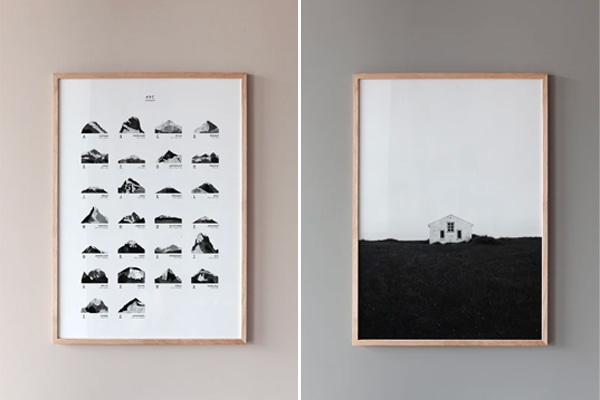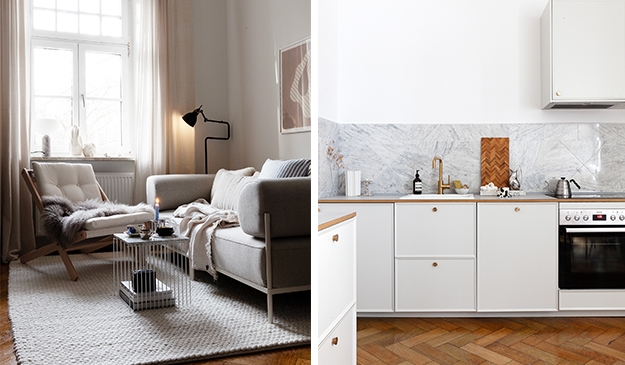Crown molding adds texture and personality to any room, including the kitchen. This functional, decorative molding is typically designed to cover the gap between the walls and ceiling. It also lends a luxe aesthetic and makes any kitchen feel more sophisticated and upscale.
You can apply ceiling molding in between your kitchen cabinets and the ceiling, or you can add cabinet crown molding to finish off the top of the upper cabinets.
If you’re thinking about making changes to your cooking space, check out this list of kitchen cabinet crown molding ideas for inspiration. With the right type of crown molding, you’re sure to find a perfect match for your chosen interior design style.
Install Dentil Molding for Bold Texture
The dentil crown molding in this kitchen features blocks of wood that give it a dramatic texture. This unique type of molding was first used during the Greek and Roman empires when blocks were carved directly into exterior stone facades to create drama.
The dentil molding lends a beautiful and elegant touch to this modern grey shaker kitchen. The top of the upper cabinets is connected to the ceiling with the entricate molding. Its white color makes it stand out against the grey cabinets.

Styled by Mia Laaksonen, photographed by Henrik Linden for Alvhem
Traditional Crown Molding Brings Versatility
The classic crown molding in this kitchen is at the top of the ceiling to bring the eye upwards, making the room look and feel larger. Paired with a large window for natural light, it adds a beautiful touch to the very top of the walls.
Note how the molding here is installed far above the cabinets, highlighting the empty wall space between the cabinet and the ceiling for a visual effect that makes the space seem bigger. The molding is also installed as trim above the range hood which helps to carry the design throughout the entire kitchen.
The top edge of the kitchen is accentuated with cabinet crown molding, marking the end of the kitchen and the start of the rest of the tall wall space.

via DeVol Kitchens
Get Bold with Intricate Designs
The white crown molding in this photo is highly decorative with intricate carvings to add a dramatic component. Note how the molding has a traditional motif, yet it’s installed in a contemporary kitchen to give it a unique contrast against the modern cabinets.
Its intricate detailing brings a sense of elegance to the space without detracting from the rest of the features in the room. Note how the molding follows the curve along one edge of the cabinet to create seamless symmetry.

via Nordiska Kök
Choose Crown Molding that Matches the Cabinet Color
The cabinet molding in this kitchen is understated and painted to match the color of the cabinets which extend to the ceiling. This design creates a cohesive look that plays well with the rest of the space including the floor and the wood shiplap trim on the wall boasting slim, vertical straight lines.
Painting your kitchen’s crown molding to match the cabinets is a smart way to create a colorful space instead of a more traditional white kitchen.

Crown Molding with Corbels Adds Dramatic Flair
This unique crown molding features decorative corbels and carvings in between each corbel. Originally, corbels were used to serve as brackets to support weight, but here, they’re used as decor.
The choice to keep the molding white allows it to keep the eyes focused on the green cabinetry and modern light fixture. While this molding is certainly bold and eye-catching, it also works well with a wide variety of styles to give the space an overall look of refinement and elegance.

via Nordiska Kök
Use Crown Molding to Highlight White Walls
This kitchen utilizes wainscotting along the wall to add texture. The added crown molding along the edge serves as a chair rail and brings it definition. Using this method not only accents otherwise bland white walls but also makes the kitchen look and feel cozy and inviting.
This kitchen is a good example of a way to use crown molding lower rather than high up against the edge of the ceiling.

Cove Molding Adds a Classic Component
Although this kitchen has a modern aesthetic, the cove crown molding brings it a touch of classic, timeless appeal. Cove crown molding has a concave, curved shape that works well when installed around corners.
Note how the molding closely matches the white cabinets but its brighter white matches the ceiling, creating a seamless look.

via Nordiska Kök
Step Crown Molding Creates Clean Lines
Step crown molding is a classic option that gives any kitchen a clean, modern look. This traditional molding works well when installed directly above floor-to-ceiling cabinets and brings some added depth and definition to the upper portion of the room.
The simple yet effective design of this molding “breaks up” the section where the top of the cabinets and ceiling meet to give the kitchen more dimension without being too overbearing.

Styled by Clindholm Design, photographed by Jocke Ono for Historiska Hem
Use Simple Molding for Smaller Kitchens
While extremely detailed crown molding gives most kitchens a touch of drama, smaller kitchens may feel too closed-in with this design. The sage green kitchen in this photo uses simple, understated molding that adds a small straight section of trim along the top edge of the cabinets.
The molding is painted in the same color to create a clean, cohesive look that won’t make the kitchen feel cramped. However, note there is a larger piece of curvy cove crown molding on the opposite wall that helps to highlight that side of the room.

via Kulladal
Decorative, Colorful Crown Molding Adds Unique Detail
In this kitchen, the crown molding is accented with a raised vine-like relief that resembles a string of garland. This fun detail gives the kitchen a subtle pop of playful texture, while the entire wall and window trim are painted in the same color to contrast nicely against the teal-colored cabinets.
The combination of different colors, shapes, and styles brings this kitchen a fun, eclectic effect, while open shelving adds another space to display plates, collectibles, and more.

via DeVOL kitchens
Use Different Crown Molding for Walls and Cabinets
The design of this kitchen uses two different types of crown molding to separate different sections subtly. In this spacious brown kitchen, a thin, flat section of smooth white crown molding installed along the walls and ceiling adds a subtle contrast against the light sand-colored walls.
A separate section of cabinet molding is installed along the edges of the upper cabinets in a matching color to create a sense of functionality that serves each respective element differently.

Styled by Lindholm, photographed by Boukari for Historiska Hem
Botanical-Inspired Crown Molding Adds Historic Elements to a Shaker Kitchen
Although this kitchen has clean, modern lines and a contemporary feel, the decorative crown molding gives it a soft and subtle touch of classic flair. The unique relief along the molding boasts botanical details that add a bit of fresh, organic style.
Because this kitchen has high ceilings, the intricate crown molding is more of an added feature rather than a detraction from the sleek and modern decor of the rest of the space.

via Alvhem
Add Cabinet Crown Molding to the Top of your Cabinets
The designer of this kitchen chose to install crown molding directly on top of the kitchen cabinets rather than along the entire length of the ceiling. Its subtle step shape slightly juts out from the edges of the upper cabinets to add a simple yet fantastic elemental component to the room.
If you look closely at the picture, you can also see simpler white crown molding along the edges of the wall that completes the look and covers the gap between the two components.




